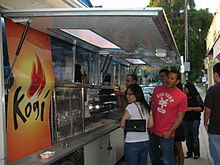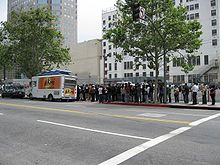
A taco is a traditional Mexican food consisting of a small hand-sized corn- or wheat-based tortilla topped with a filling. The tortilla is then folded around the filling and eaten by hand. A taco can be made with a variety of fillings, including beef, pork, chicken, seafood, beans, vegetables, and cheese, and garnished with various condiments, such as salsa, guacamole, or sour cream, and vegetables, such as lettuce, onion, tomatoes, and chiles. Tacos are a common form of antojitos, or Mexican street food, which have spread around the world.

A burrito in Mexico is, historically, a regional name, among others, for what is known as a taco, a tortilla filled with food, in other parts of the country. The term burrito was regional, specifically from Guanajuato, Guerrero, Michoacán, San Luis Potosí and Sinaloa, for what is known as a taco in Mexico City and surrounding areas, and codzito in Yucatán and Quintana Roo. Due to the cultural influence of Mexico City, the term taco became the default, and the meaning of terms like burrito and codzito were forgotten, leading many people to create new meanings and folk histories. In modern times, it is considered by many as a different dish in Mexican and Tex-Mex cuisine that took form in Ciudad Juárez, consisting of a flour tortilla wrapped into a sealed cylindrical shape around various ingredients. In Central and Southern Mexico, burritos are still considered tacos, and are known as “tacos de harina”. The tortilla is sometimes lightly grilled or steamed to soften it, make it more pliable, and allow it to adhere to itself. Burritos are often eaten by hand, as their tight wrapping keeps the ingredients together. Burritos can also be served "wet", i.e., covered in a savory and spicy sauce, when they would be eaten with a fork and knife.
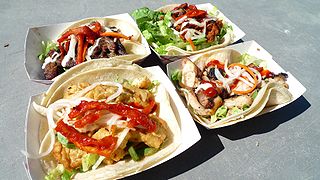
Korean tacos are a Korean-Mexican fusion dish popular in a number of urban areas in the United States and Canada. Korean tacos originated in Los Angeles, often as street food, consisting of Korean-style fillings, such as bulgogi and kimchi, placed on top of small traditional Mexican corn tortillas. Korean burritos are a similarly themed dish, using larger flour tortillas as a wrap.
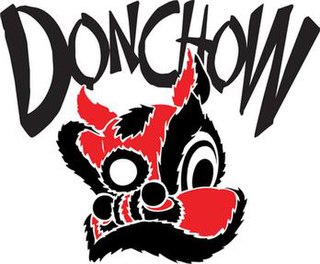
Don Chow Tacos was a Chinese-Mexican fusion food truck based in Los Angeles, California. It was founded on April 22, 2009, by Dominic Lau and Lawrence Lie with the motto, "Where Chino meets Latino", representing their Chinese heritage and Hispanic influences. Don Chow Tacos ceased operations on February 16, 2015.

Roy Choi is a Korean-American chef who gained prominence as the creator of the gourmet Korean-Mexican taco truck Kogi. Choi is a chef who is celebrated for "food that isn't fancy" and is known as one of the founders of the gourmet food truck movement. In 2019, Choi began presenting a cooking series on Netflix with Jon Favreau titled The Chef Show.

Chef is a 2014 American road comedy-drama film directed, written, co-produced by, and starring Jon Favreau as a celebrity chef who, after a public altercation with a food critic, loses his job at a popular Los Angeles restaurant and begins to operate a food truck with his young son. It co-stars Sofía Vergara, John Leguizamo, Scarlett Johansson, Oliver Platt, Bobby Cannavale, and Dustin Hoffman, along with Robert Downey Jr. in a cameo role.
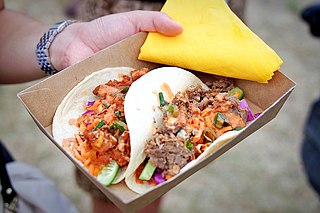
Korean–Mexican fusion is a type of fusion cuisine originally from Los Angeles that combines traditional elements of American-style Mexican and Korean foods. The earliest Korean-Mexican fusion featured Mexican or Tex-Mex dishes such as tacos or burritos filled with Korean-style barbecued meats and kimchi. Typical dishes include Korean tacos and bulgogi burritos. Food critics Jane and Michael Stern state that Korean–Mexican fusion is a growing food trend that has steadily gained in popularity since 2009.

A taco stand or taquería is a food stall, food cart or restaurant that specializes in tacos and other Mexican dishes. The food is typically prepared quickly and tends to be inexpensive. Many various ingredients may be used, and various taco styles may be served. Taco stands are an integral part of Mexican street food. Tacos became a part of traditional Mexican cuisine in the early 20th century, beginning in Mexico City, as what had been a miner's snack began to be sold on street corners in the city. Shops selling tacos have since proliferated throughout Mexico and other areas with a heavy Mexican culinary and cultural influence, including much of the Western United States and most other larger American cities. More typical taquerías specialize in tacos, as expected, but in some localities it can be used to refer to restaurants specializing in burritos, where tacos themselves are less of a point of emphasis.
Locol was a restaurant founded by Roy Choi and Daniel Patterson. The name connoted both "local" and "loco". The restaurant aspires to serve healthy alternatives to fast food at affordable prices while benefiting communities and disrupting food deserts. The restaurant's first location was in the Watts neighborhood of Los Angeles. After opening several other locations in California, all closed in 2018. Choi later revived the brand in 2020 as a delivery-only "virtual restaurant".

Papi Chulo's is a restaurant with two locations in Portland, Oregon, in the United States. The original taqueria in the Pearl District was opened by restaurateur Ramzy Hattar in December 2019, with Antonio Javier Palma Caceres as the chef and Davide Bricca overseeing cocktails. The trio had previously worked together at River Pig Saloon and Two Wrongs, two neighboring establishments also owned by Hattar. A second location opened in northeast Portland in 2023. Papi Chulo's serves Mexican cuisine, such as tacos, burritos, nachos, birria, margaritas, and micheladas.

Quesabirria is a Mexican dish comprising birria-style cooked beef folded into a tortilla with melted cheese and served with a side of broth for dipping. The dish, which has origins in Tijuana, Mexico, originally made with goat meat, gained popularity in the United States through Instagram. It is now made also with other meats, such as beef and chicken.
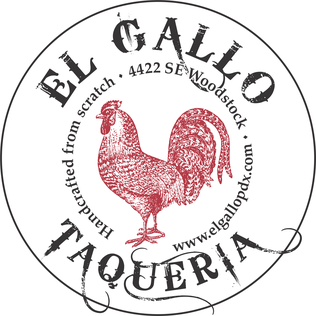
El Gallo Taqueria was a Mexican restaurant in Portland, Oregon, United States. Owner and chef Jake Brown established the business as a food cart in 2009, in southeast Portland's Woodstock neighborhood. In 2015, El Gallo relocated and began operating as a brick and mortar restaurant in 2015. The business closed in 2022.

Matt's BBQ is a barbecue restaurant in Portland, Oregon's Boise neighborhood. Sibling restaurant Matt's BBQ Tacos, also located in Portland, opened in 2019.

Taqueria Los Puñales is a queer-owned and operated Mexican restaurant in Portland, Oregon. Opened by Brian Aster and David Madrigal in 2020, during the COVID-19 pandemic, the restaurant has garnered a generally positive reception.

Mis Tacones is a Chicano and queer-owned vegan taquería in Portland, Oregon.

Batterfish was a fish and chip shop in Portland, Oregon. Previously, the business operated in Encino, Los Angeles, as a food truck in Santa Monica, California, and as a food cart in Happy Valley, Oregon. Batterfish specialized in fish and chips and was featured on the Food Network's Diners, Drive-Ins and Dives. The restaurant closed by 2023.
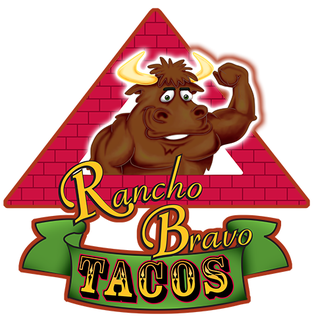
Rancho Bravo Tacos was a small chain of Mexican restaurants in Seattle, in the U.S. state of Washington. Owner Freddy Rivas started the business as a food truck in Kent in 2002, before relocating to Wallingford in 2007. The business also operated restaurants on Capitol Hill and in the University District. Serving cuisine such as tacos, nachos, burritos, tamales, and tortas, the business garnered a generally positive reception as an inexpensive and late night option for diners, with the tacos and burritos receiving the most praise.

Colloquially referred to as Loncheras, Taco trucks have become an iconic symbol of Mexican culture in the United States. Popularized in Los Angeles, Loncheras are often characterized by rough exteriors, bright colors, and bold murals. Operators have been able to build loyal clientele using familiar parking spots, social media, and after-dark hours. Though taco trucks are a staple food for Angelenos of every race, Loncheras in Los Angeles are chiefly owned and operated by Hispanic and Latino families in low to moderate-income areas. Since Raul Martinez's first mobile truck success, taco trucks have continued to serve as windows of opportunity for migrant families and prospective chefs to earn a living. Taco trucks, like all Mexican street food, have allowed Mexican Americans to stay connected to their heritage while adjusting to a new country, community, and way of life. Success among authentic Mexican taco trucks later inspired "fusion taco trucks". Roy Choi's Kogi BBQ food truck, a Korean-Mexican short rib taco truck, is considered to be the first "fusion" taco truck in Los Angeles. The opening of Choi's truck marked a gastronomic explosion on the Los Angeles taco truck horizon. Both regular and fusion taco trucks help meet the high demand for fast, affordable, and convenient street food in the Golden city.
